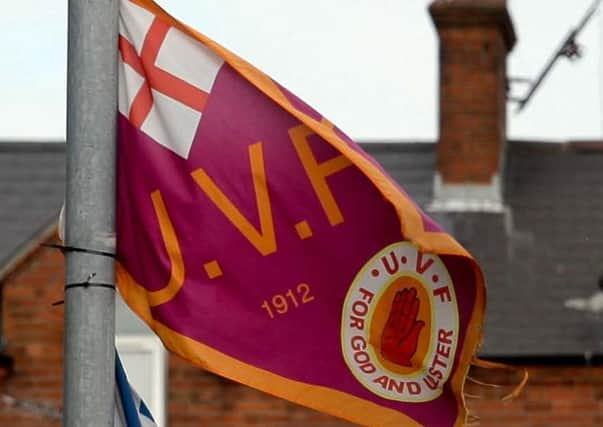Executive parties split over proposal to decriminalise terrorist groups to secure peace process, as raised by paramilitary watchdog IRC


The idea was floated this week by the Independent Reporting Commission (IRC), which was set up after the murder of Kevin McGuigan by PIRA members in Belfast in 2015.
In its second report the IRC said that although there are thousands of members of paramilitary organisations, the vast majority are “dormant” and that “the time has come – for the benefit of society - for consideration to be given to a dedicated transition process for paramilitaries themselves to bring paramilitarism to an end”.
Advertisement
Hide AdAdvertisement
Hide AdIt added: “Deproscription [decriminalisation], and whether or not the deproscribing of a paramilitary organisation is a viable option, also needs to be addressed”.
The IRC raised the issue again in a report, this week, adding that it welcomed a recent commitment by the Stormont Justice Minister to bring forward a paper to the Executive on some of the issues.
Asked if it had suggested to the Executive that decriminalisation would be a viable option, the Department of Justice (DOJ) said that it had not, adding that this was a matter for the UK government.
A DOJ spokesman added: “The Minister is on record as being opposed to de-proscription, and focused on transformation and rehabilitation of individuals rather than normalisation of the continuance of paramilitary structures in our community.”
Advertisement
Hide AdAdvertisement
Hide AdThe News Letter asked both the DUP and Sinn Fein if they opposed decriminalisation, however neither of them appeared to give clear positions on the issue.
A DUP Spokesman said: “Clearly any decision on deproscription is a matter for the relevant authorities but it should never be considered for those organisations involved in criminality who continue to blight their own communities.”
A Sinn Féin spokesperson said: “There is no place for any armed groups in our society in 2020, 22 years on from the signing of the Good Friday Agreement. The public wants an end to their ongoing recruitment, procurement of weapons and want them to leave the stage.”
Asked to clarify if they unequivocally oppose decriminalisation, neither party offered any additional comment.
Advertisement
Hide AdAdvertisement
Hide AdSDLP Legacy Spokesperson Dolores Kelly MLA said: “The Minister for Justice is due to bring forward a report on the impact of Deproscription. We await the findings of that report and will study them carefully. In all of this, we have to remember the victims of the paramilitaries and consider what impact deproscription would have on them. Whilst we acknowledge many former paramilitaries are transitioning and the majority are not involved in violence anymore, it still has to be recognised there remains passive control in some communities and as the IRC acknowledges, deproscription should only be considered as a last resort.”
The UUP, Alliance Party, TUV and Innocent Victims United have all unequivocally opposed decriminalisation.
Loyalist activist Jamie Bryson said it would be difficult to see how any transition process for paramilitary groups could avoid decriminalisation. He also claimed that paramilitary groups are not currently treated equally. “The Paramilitary Crime Task Force have never uttered one word about PIRA,” he said.
Daniel Holder of human rights campaign group, the Committee on the Administration of Justice (CAJ) said that the legal requirement to continue criminalising a terror group is that it must still be “concerned in terrorism”.
Advertisement
Hide AdAdvertisement
Hide Ad“This has been controversial over the years particularly with the UDA not being proscribed for many years when the authorities knew that the threshold had long been met,” he said.
“There is already a system for deproscription under the Terrorism Acts that is and has long been a mess, and has been criticised by the government’s own independent Terrorism Act reviewers. Organisations no longer ‘concerned in terrorism’ can be deproscribed, but in practice it just does not happen and there needs to be greater legal certainty over that process.”
A message from the Editor:
Thank you for reading this story on our website. While I have your attention, I also have an important request to make of you.
Advertisement
Hide AdAdvertisement
Hide AdWith the coronavirus lockdown having a major impact on many of our advertisers - and consequently the revenue we receive - we are more reliant than ever on you taking out a digital subscription.
Subscribe to newsletter.co.uk and enjoy unlimited access to the best Northern Ireland and UK news and information online and on our app. With a digital subscription, you can read more than 5 articles, see fewer ads, enjoy faster load times, and get access to exclusive newsletters and content. Visit https://www.newsletter.co.uk/subscriptions now to sign up.
Our journalism costs money and we rely on advertising, print and digital revenues to help to support them. By supporting us, we are able to support you in providing trusted, fact-checked content for this website.
Alistair Bushe
Editor